--Portrait of the Week—
IN ALGERIA, the situation was serious, but not hope- less; in France, the situation was hopeless, but not serious. In Blantyre, the situation was nasty, and in- the House of Commons it was confused. In in House, the situation was settling down, In the British Motor Corporation's Birmingham factory it was boiling up, in the engineering in- dustry- it was deadlocked, and in South Africa it was simply WOTSC.
RF.RF.LS in Algiers were firmly entrenched behind 'authori- ties' their barricades, and the French 'autho- hes, there seemed by no means inclined to do anything about it. President de Gaulle was re- ported to be having grave difficulty in persuading his Cabinet that the rebels must be attacked if have would not give in, but the Cabinet seemed to nave logic on its side; it seemed highly unlikely that if the President did give the orders to attack, his army would shoot, his air force would.' fly or his navy would sail. (His bomb, of course,
might still go off.) The Fifth Republic was turning out to be a house built on sand, and President de Gaulle was learning the-hard way that as a man sowed' so also shall he reap.
*
scUNLS WORMY, or unworthy, of the Union of South Africa occurred in Blantyre during the
), la
'irne Minister's visit to Nyasaland. A crowd of hostile but peaceful and even good-humoured Africans had arrived outside his hotel to demon- strate, when European police officers started a riot • by indulging in unprovoked brutality, hitting out with sticks and batons, punching and kicking without arresting demonstrators haphazardly and without apparent justification. The African police, by contrast, appear to have behaved in an exem- PlaTY fashion. The guest of honour, during all this, went on eating ripe pheasant specially flown from Scotland, and then made a speech which was not well received. Meanwhile, farther (though not much farther) south, two services were held at the Pit-head for the 400 miners killed in the South African Mine-disaster; one for the whites, one for the
*
1"1.SU OF COMMONS reassembled after the k-hristmas recess. The whole House conveyed its ',,Yintl)at4 to the Honourable Member for Can- t °", and asked that its good wishes be conveyed \,,:1,1e1 to the Right HOnourable Member for Ebbw Wate, But Africa was waiting to muddy the clear 'fiet's of unanimity. No criminal proceedings, it e 1,s learned, would be taken as a result of any finless given before the Monckton Commission, .ess it was repeated orally or in writing outside. h aPPcared, to ,many to be an effective way of eXelllitig any discussion in public or press of the- .."enee, and when Mr. Cuthbert Alport had ilni,Shed defending the position it still appeared -(1.1 be an effective way of preventing any discussion tienblic or press of the evidence. BUL at any rate, arkena Cnstitutional Conference finally ted at Lanca Constitutional
House.
*
(:■s; .1111 BOMLSTIC INDUSTRIAL FRONT there were bairnThe engineering employers rejected the buim 'by the engineering unions for higher pay. olfered to reduce hours from 44 a week.to 421. seemod be unacceptable to the unions,. at '-IY,rate for the moment. At the same time a strike 'bit tne Electrical Trade Union's fifty-five members lhthe British Motor Corporation factory in By- ofingbain seemed likely to throw 50,000 men out h Work. But Mr. Haxell was reported to have iheen beaten in the election for the Presidency of frF Electrical Trades Union, though whether his 1,1e,nd,s (who, after all, were in charge of the ballot of would let a mere defeat stand in the way seenis being pronounced elected remained to be






































 Previous page
Previous page